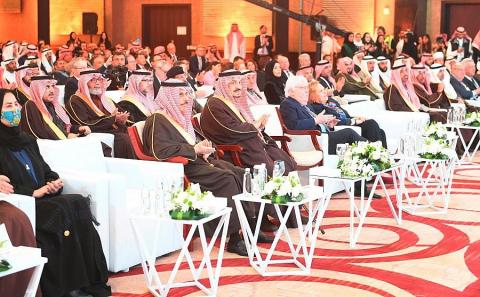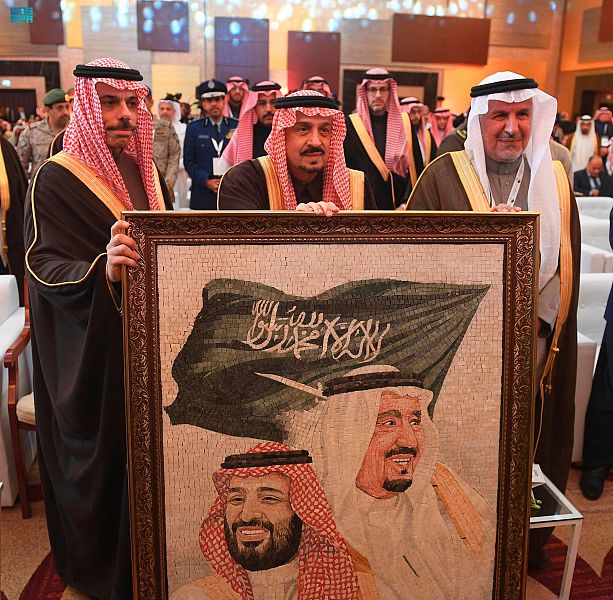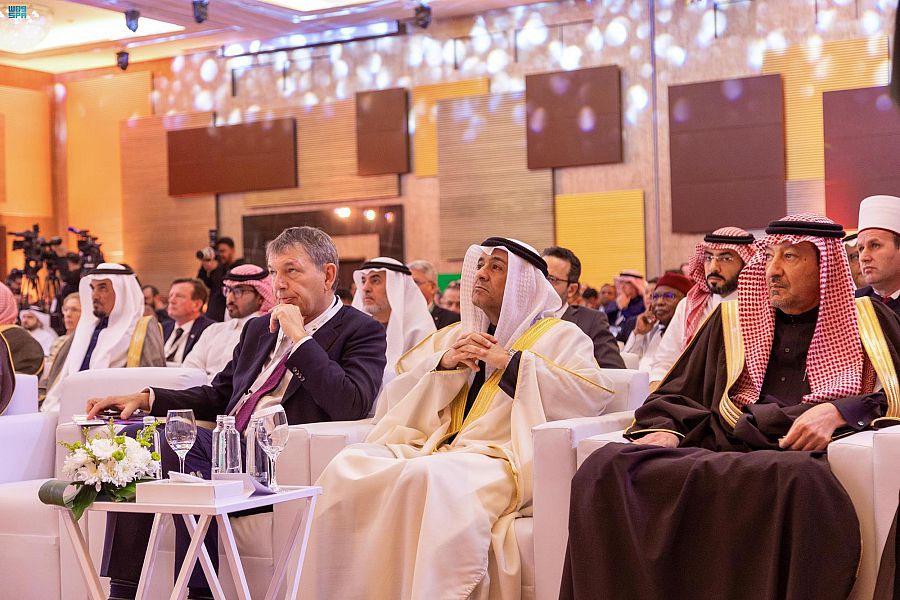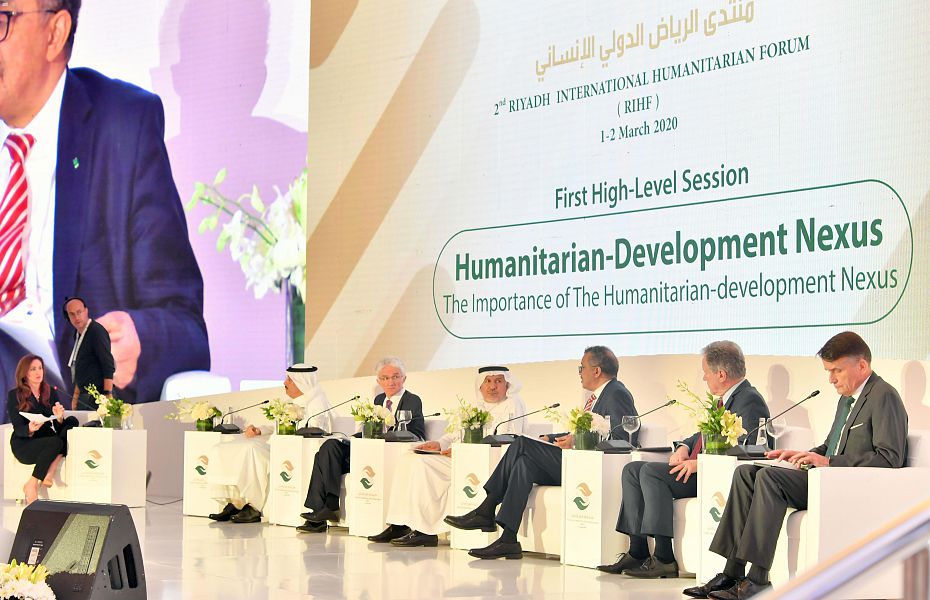
Governor of Riyadh Region Prince Faisal bin Bandar bin Abdulaziz attended on Monday the inauguration of the Riyadh International Humanitarian Forum (RIHF3).
The event is being held under the patronage of the Custodian of the Two Holy Mosques King Salman bin Abdulaziz. It is organized by the King Salman Humanitarian Aid and Relief Center (KSrelief) in partnership with the United Nations and its humanitarian organizations in Riyadh.
During an opening address, Advisor at the Royal Court and KSrelief General Supervisor, Dr. Abdullah bin Abdulaziz Al Rabeeah welcomed the participants to Riyadh.
He underlined the support from King Salman and the follow-up of Prince Mohammed bin Salman, Crown Prince, and Prime Minister.
Dr. Al Rabeeah said: "We are meeting today as the world is witnessing many disasters, crises, conflicts, and events that have exacerbated the humanitarian situation and multiplied its challenges.”
The latest of these tragedies is the earthquake that struck Türkiye and Syria, claiming the lives of tens of thousands of people and leaving millions homeless.
He stressed that today's meeting calls for more concerted efforts and expansion of donors, states, bodies, and individuals, and raising the level of coordination and impact of humanitarian aid so that work will be more effective and responsive.
He noted that the forum has enjoyed great interest and active participation from the UN and international, regional and local organizations, as well as active leaders in humanitarian efforts from 50 countries and nearly 60 organizations.
Martin Griffiths, Under-Secretary-General for Humanitarian Affairs and Emergency Relief Coordinator, delivered a speech on behalf of the UN Secretary-General, Antonio Guterres.
He thanked Saudi Arabia, explaining that the humanitarian scene is a harsh one, as the needs are growing all over the world.
He noted that the world is experiencing the largest food crisis in modern history and famine is knocking on many doors. He cited challenges caused by the Ukraine war and catastrophe of the Turkiye and Syria earthquakes.
Griffiths added that more than 350 million people need humanitarian assistance around the world. More than 222 million people do not know when they will eat their next meal or whether they will find something to eat at all, and 45 million people are already on the brink of starvation, most of them women and children. He added that nearly $54 billion was needed to meet the basic needs of the most affected people.
Griffiths called for ending wars and conflicts, stopping the outbreak of new conflicts, and addressing climate change directly because every flood, heat wave, drought, or severe storm leaves in its wake a humanitarian crisis.
Saudi Minister of Foreign Affairs Prince Faisal bin Farhan said: "Driven from the values of our true Islamic religion, the kings of the Kingdom of Saudi Arabia, since its founding by King Abdulaziz bin Abdul Rahman Al Saud and his sons, up to the era of King Salman, have always been keen to rally all efforts and mobilize the Kingdom’s capabilities to serve humanitarian causes to alleviate the suffering of stricken people and provide relief to the distressed wherever the need arises, without racial or religious discrimination.”
He added that the volume of the aid supplied by the Kingdom over the past seven decades amounts to $95 billion, benefiting 160 countries around the world.
He added that amid geopolitical and economic crises and challenges, the Kingdom continues to advance in its humanitarian contributions, making it at the forefront of donors of development and humanitarian aid to low- and middle-income countries, with an amount exceeding $7 billion.
He recalled that the last humanitarian efforts of the Kingdom were the directives of King Salman and Crown Prince Mohammed to operate an air bridge, provide various humanitarian aid, and organize a national campaign to mitigate the effects of the earthquake on the Syrian and Turkish peoples.
"These repeated events remind us of our urgent need for humanity without borders, to ensure the preservation of human dignity, and prompt us to redouble efforts to avoid the scourge of war, to cooperate in facing disasters, and to ensure the delivery of aid to those who deserve it in line with international humanitarian law and the principles of humanitarian action,” he stressed.
The Kingdom has worked proactively to reduce the deterioration of the conditions of affected countries and societies and to seek practical and effective solutions through regional and international cooperation, he went on to say.
The Kingdom announced in the past two years a series of initiatives that proved its leadership in climate affairs at the regional and global levels, he remarked. He cited the establishment of a Riyadh-based regional center for the Middle East and North African countries to reduce carbon emissions.
The center was set up in cooperation with the United Nations Economic and Social Council for Western Asia (ESCWA).
Meanwhile, Dr. Al Rabeeah signed approval to allocate sums of money for new and various projects for those affected by the earthquake in Syria and Turkiye, with a value exceeding SAR183 million.
The first project, valued SAR75 million, includes the construction of 3,000 housing units to shelter those affected by the earthquake. The second, with a value of SAR40 million, will sponsor orphans affected by the earthquake,
The third project, with a value of SAR18 million, includes the implementation of a voluntary program for the benefit of the victims (Saudi Volunteer Life). The fourth project, worth more than SAR17.8 million, will provide life-saving health care services.
The fifth project, valued at of more than SAR6,500,000, includes the implementation of life-saving water and sanitation interventions. The sixth project, worth more than SAR6,500,000, calls for providing basic nutrition supplies. The seventh project, with a value of more than SAR19,800,000, includes the urgent medical response to relief the earthquake victims in Syria.








